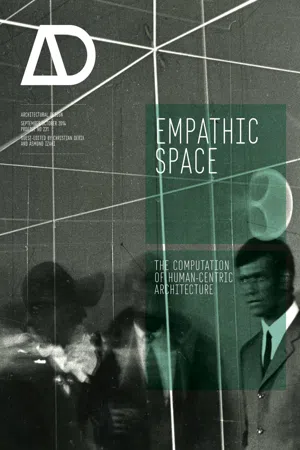
- English
- PDF
- Available on iOS & Android
About This Book
In recent years, questions of space have gained renewed momentum in architecture and urban design, as adaptation, densification and sustainable regeneration have become an increasing priority. While most computing-based design tends to emphasise the formal aspects of architecture, overlooking space and its users, the 'original' computational design approaches first spearheaded in the UK in the 1960s and 1970s tended to be focused on behavioural and occupational patterns. Over the last decade, a new generation of design research has emerged that has started to implement and validate previous investigations into spatial computation, aiming to understand how to design spatial configurations based on user experiences. This revives an interest in the experiential that was first explored in the early 20th century by German and Nordic organic architects, who invented design methods that correlated cognitive responses of buildings' occupants to spatial structure. The current revival of human-centric design, however, represents the first design approach that synthesises spatial design and algorithmic techniques with organic design thinking, which could also be regarded as a return to the 'first principles' of architectural design.
Contributors include:
Paul Coates, Christian Derix, Olafur Eliasson, Lucy Helme, Bill Hillier, Åsmund Izaki, Prarthana Jagannath, Dan Montello, Juhani Pallasmaa, Philip Steadman and Guy Theraulaz.
Featured Architects/Designers:
Jussi Ängeslevä (Art+Com), Stan Allen, Aedas|R&D, Markus Braach (Kaisersrot), Hermann Hertzberger, Kazuhiro Kojima (Cat), Pablo Miranda and Rafi Segal.
Frequently asked questions
Information
Table of contents
- Cover
- Title Page
- Copyright Page
- Contents
- EDITORIAL
- ABOUT THE GUEST-EDITORS
- SPOTLIGHT: Visual highlights of the issue
- INTRODUCTION: The Space of People in Computation
- HEURISTIC GENERATION
- INTERACTIONS IN THE FIELD
- COGNITIVE CONDITIONS
- EXPERIENTIAL TYPOLOGIES
- FUTURE FORWARD
- COUNTERPOINT: How Can Code be Used to Address Spatiality in Architecture?
- CONTRIBUTORS
- EULA